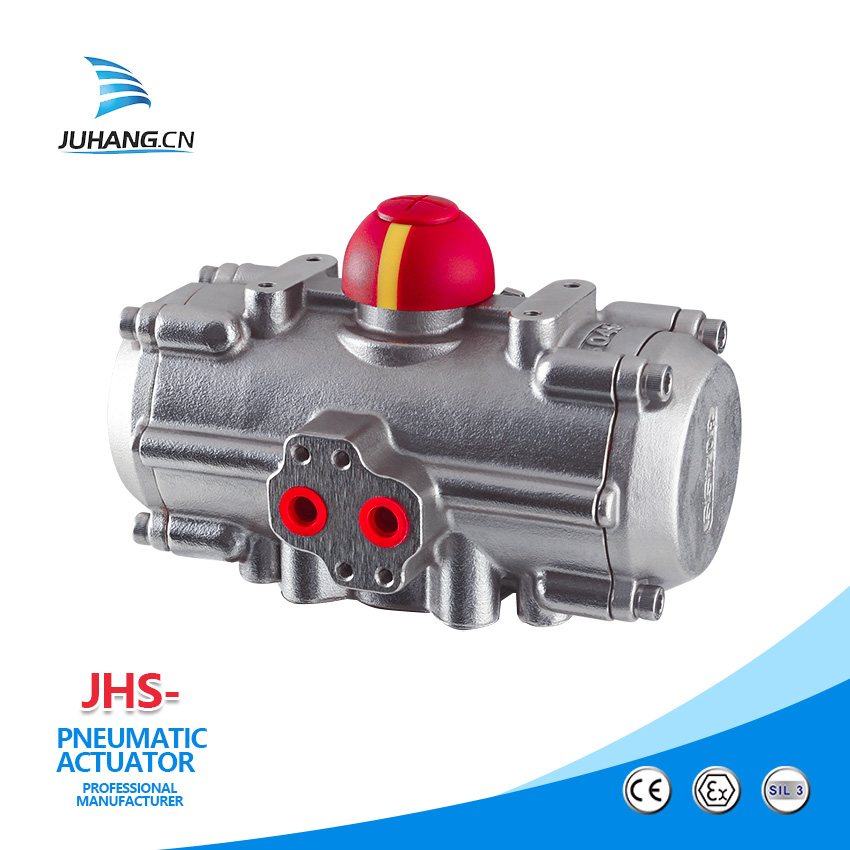The Importance of Stainless Steel Pneumatic Actuators in Industrial Applications
2025-03-25
In modern industrial applications, automation plays a key role in improving efficiency, reliability, and precision. One essential component in many automated systems is the actuator. Pneumatic actuators, specifically stainless steel pneumatic actuators, are widely used in various industries due to their strength, durability, and versatility. These actuators offer a cost-effective solution for controlling the movement of machinery and equipment in a variety of environments.
What is a Stainless Steel Pneumatic Actuator?
A pneumatic actuator is a device that uses compressed air to produce mechanical motion. These actuators are typically employed in systems where linear or rotary motion is needed to perform a particular function. Stainless steel pneumatic actuators are built using high-quality stainless steel materials, which provide several advantages, including resistance to corrosion, higher strength, and longevity.
The actuator works by converting the energy from compressed air into mechanical force, which can then move valves, gates, or other mechanical parts. In industries like oil and gas, water treatment, and food processing, stainless steel pneumatic actuators are invaluable because they offer a reliable and efficient means of controlling machinery.
Why Choose Stainless Steel Pneumatic Actuators?
1. Corrosion Resistance: Stainless steel is known for its resistance to corrosion and rust, making it ideal for use in harsh environments such as chemical processing plants, offshore rigs, and food production facilities. Pneumatic actuators made from stainless steel are able to withstand exposure to moisture, acids, and other corrosive substances without deteriorating quickly.
2. Durability: Stainless steel is a strong, durable material that is capable of withstanding high pressures, extreme temperatures, and mechanical stresses. This durability ensures that stainless steel pneumatic actuators have a long lifespan and are less prone to wear and tear, reducing the need for frequent replacements and maintenance.
3. Hygienic and Easy to Clean: In industries like food and beverage production or pharmaceuticals, hygiene is critical. Stainless steel is easy to clean, which is an essential characteristic for pneumatic actuators used in these sectors. Its smooth, non-porous surface prevents the buildup of contaminants, making maintenance and sanitation tasks easier.
4. Versatility: Stainless steel pneumatic actuators are versatile and can be used in a wide range of applications. Whether it's for controlling valves in an automated assembly line or adjusting the position of a gate in a wastewater treatment plant, these actuators can handle various loads and motions. Their ability to deliver both linear and rotary motion further adds to their flexibility.
Applications of Stainless Steel Pneumatic Actuators
Stainless steel pneumatic actuators are used in many industries, including:
1. Oil and Gas Industry: In the oil and gas sector, these actuators are often used for controlling valves and other equipment in challenging environments. They are capable of operating efficiently in offshore rigs or oil refineries where high resistance to corrosion is necessary.
2. Water Treatment: Stainless steel pneumatic actuators are also crucial in water treatment facilities, where they help manage the flow of water through various filtration and treatment systems. The durable and corrosion-resistant nature of these actuators makes them ideal for handling harsh chemicals and wastewater.
3. Food and Beverage Industry: In food processing plants, where hygiene is a top priority, stainless steel pneumatic actuators are used for controlling processes like mixing, packaging, and bottling. Their easy-to-clean surface prevents contamination, ensuring that the final product remains safe for consumption.
4. Pharmaceutical Industry: Pneumatic actuators are also critical in the pharmaceutical industry for controlling processes such as liquid dosing, packaging, and filtration. The high hygiene standards in these facilities make stainless steel the material of choice for actuators.
5. Automotive Manufacturing: Pneumatic actuators are frequently used in automotive production lines to automate processes like assembly, painting, and packaging. The robustness of stainless steel ensures that the actuators can endure the demanding conditions of these high-speed environments.
Benefits of Using Pneumatic Actuators
In addition to the advantages offered by stainless steel, pneumatic actuators themselves come with several benefits. Compared to electric or hydraulic actuators, pneumatic actuators are relatively simple, cost-effective, and easy to maintain. They are also lighter in weight and can generate significant force despite their compact size.
Moreover, pneumatic actuators are highly reliable because they are powered by air, which is abundant and easy to supply. They also do not require the use of external electrical power sources, making them a safer option in hazardous environments, as they do not pose a risk of sparks or electrical hazards.
Conclusion
Stainless steel pneumatic actuators are crucial in many industrial applications due to their strength, corrosion resistance, and versatility. From controlling valves in oil refineries to regulating processes in food production, these actuators offer an efficient and durable solution for industries requiring automation. By choosing stainless steel pneumatic actuators, businesses can benefit from longer-lasting, high-performance equipment that enhances productivity and minimizes maintenance costs. As industries continue to advance and demand higher efficiency, the role of pneumatic actuators in automation systems will only become more significant.



